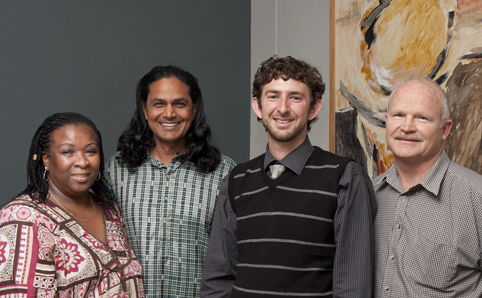Latest News Archive
Please select Category, Year, and then Month to display items
12 October 2020
|
Story Arina Engelbrecht
|
Photo Supplied
 Arina Engelbrecht from Organisational Development and Employee Well-being believes physical activity has a number of benefits for one’s health, including stress relief.
Arina Engelbrecht from Organisational Development and Employee Well-being believes physical activity has a number of benefits for one’s health, including stress relief.
Being physically active plays a big role in preventing the development of mental-health problems and in improving the quality of life of people experiencing mental-health problems.
Treatment for depression
Physical activity can be an alternative treatment for depression. It can be used as a stand-alone treatment or in combination with medication and/or psychological therapy. It promotes all kinds of changes in the brain, including neural growth, reduced inflammation, and new activity patterns are formed that promote feelings of calm and well-being. It releases endorphins – powerful chemicals in the brain that energise your spirit and make you feel good.
Physical activity can be very effective in relieving stress. Research in adults has found that physically active individuals tend to have lower stress levels compared to individuals who are less active. It also leads to improved sleep. When a person sleeps better and feels more rested, overall quality of life improves. They cope better with daily life stressors.
Reduce Alzheimer's risk
Regular physical activity can reduce your risk of developing Alzheimer's disease by up to 50%. It can also slow down further deterioration in those who have already started to develop cognitive problems. It stimulates the brain’s ability to maintain old connections as well as to make new ones.
A study asked people to rate their mood immediately after periods of physical activity (e.g. going for a walk/run, cycling, doing housework) and periods of inactivity (e.g. reading a book or watching television). Researchers found that participants felt more content, more awake, and calmer after being physically active compared to after periods of inactivity.
In conclusion, people who are physically active feel a sense of well-being, feel more energetic throughout the day, sleep better at night, have sharper memories, and feel more relaxed and positive about themselves and their lives.
“Being physically active not only changes your body, it changes your mind,
attitude, and your mood.” – Arina Engelbrecht
Former Kovsie named best teacher in the Western Cape
2011-11-14
 |
|
Proud educators from left: Mrs Julia Ramabenyane, lecturer at the School of Social Sciences and Language Education; Prof. Dennis Francis; Roland Rudd; and Prof. Okkie Combrinck, Head of the School of Mathematics Natural Sciences and Technology Education.
Photo: Hannes Pieterse
|
Kovsie alumni are second to none. This was proven by Roland Rudd who was recently named Best Secondary School Educator in the Western Cape. Roland, a teacher at Wineberg Boys’ High School, completed his education studies at the University of the Free State (UFS) in 2005.
Visiting the university's Bloemfontein Campus last week Roland was full of praise about the education he received at Kovsies. “I have made it known that my success is through the input and solid grounding the UFS offered me. I feel really indebted to the Faculty of Education and the university. I believe that this is the best education faculty and university in South Africa.”
Roland, who teaches Engineering Graphics and Design to Grade 10 -12 learners, met with former Faculty of Education lecturers during his visit. They all remembered a bright student who won best student awards every year. In his final year Roland won the award for best student in practical teaching. Prof. Dennis Francis, Dean of the Faculty of Education, said he was pleased that one of his faculties’ graduates was doing so well.
Roland will compete in January 2012 in the national best school educator competition.